| Release List | Reviews | Price Search | Shop | Newsletter | Forum | DVD Giveaways | Blu-Ray/ HD DVD | Advertise |
| Reviews & Columns |
|
Reviews DVD TV on DVD Blu-ray International DVDs Theatrical Reviews by Studio Video Games Features Collector Series DVDs Easter Egg Database Interviews DVD Talk TV DVD Talk Radio Feature Articles Columns Anime Talk DVD Savant HD Talk Horror DVDs Silent DVD
|
DVD Talk Forum |
|
|
| Resources |
|
DVD Price Search Customer Service #'s RCE Info Links |
|
Columns
|
 |
The Paul Newman Collection
|
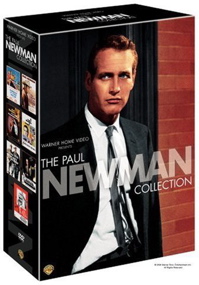
|
Warner DVD Somebody Up There Likes Me, The Left Handed Gun, The Young Philadelphians, Harper, Pocket Money, The MacKintosh Man, The Drowning Pool Starring Paul Newman Street Date November 14, 2006 59.92 the boxed set Reviewed by Glenn Erickson |
Somebody up in Warner Home Video must like Paul Newman, because we won't find The Silver Chalice in this retrospective! The Paul Newman Collection is set of good films that includes his breakthrough picture and several highlights down the line ... with a couple of lesser attractions. But I've yet to see a Paul Newman picture that wasn't entertaining.
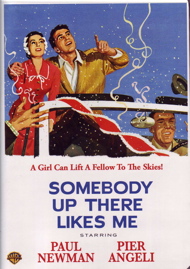
Somebody Up There Likes Me
1956/ B&W / 1:78 enhanced anamorphic / 114 min. / Not Available Separately
Starring Paul Newman, Pier Angeli, Everett Sloane, Eileen Heckart, Sal Mineo, Harold J. Stone, Joseph Buloff, Robert Loggia, Steve McQueen
Cinematography Joseph Ruttenberg
Art Direction Malcolm Brown, Cedric Gibbons
Film Editor Albert Akst
Original Music Bronislau Kaper
Written by Ernest Lehman from an autobiography by Rocky Graziano, Rowland Barber
Produced by Charles Schnee
Directed by Robert Wise
Paul Newman's self-acknowledged breakthrough film benefits from tight directing from Robert Wise (in gritty mode) and a slick screenplay by Ernest Lehman. This perfect showcase part for a method actor comes in a crowd-pleasing tale of a hoodlum who finds atonement in the fight game and the love of a faithful woman. Sylvester Stallone should be ashamed; his manipulative Rocky movies owe everything to this thoughtful original.
Somebody Up There Likes Me must have been God's gift to Paul Newman, as it distinguished him from the pack of James Dean substitutes, in a picture penciled in for Dean before he was killed. Actually, Newman has much more thug potential than Dean, and musters a convincing broken-nosed moose manner to effectively play the gutter-born fighting champ Rocky Graziano.
For 1956 the script is refreshingly raw. Nobody makes 'environmental' excuses for the teenaged criminals, whose neighborhood crimes are blocked similarly to the Jets 'n' Sharks hijinks in Robert Wise's West Side Story. We understand Rocky's roots clearly when the film begins with his drunken father pummeling him for fun. The unbelievably ignorant Rocky goes through four or five levels of prisons and military stockades before learning that burning wardens with cigarettes and punching out Army officers carry terrible penalties.
The title is apt in that Rocky somehow avoids being shot or beaten to death long enough to taste the possibility of leading a decent 'legit' life. Newman doesn't play Rocky as some kind of abused ghetto flower and Ernest Lehman's script never goes in for poetic conceits about Rocky's existential dilemmas. Graziano's ultimate problems with the boxing commission were surely tidied up somewhat for the screen, and Lehman does turn on the hometown sentiments for Rocky's crucial title fight, but neither exercise gets out of hand.
The Sancho Panza rule is that we wouldn't give a hoot for Quixote if he didn't have an adoring sidekick, and Somebody Up There Likes Me gives Rocky both Everett Sloane's loyal manager and Pier Angeli's realistically supportive wife. Angeli is completely believable and the overall tone of the show so correct that ploys like sending Rocky home to New York for neighborhood ice cream and to reconcile with his dad come off as inspired.
I've never seen more than clips of Somebody Up There Likes Me until this viewing and I was impressed by Robert Wise's handling of a terrific cast, especially the 'new faces': Robert Loggia and a brief but effective Steve McQueen as a pool hall punk. I'm also shocked to see how much of the Oscar-winning Rocky formula was swiped from this picture; I don't remember anybody mentioning that in 1976. Rocky Balboa is an exaggerated "straight-parody" of this character, and a hateful example of 'noble ignorance' celebrated as an American Value to be cherished. Rocky Graziano doesn't disgracefully wrap himself in the flag.
The film's crisp B&W photography might make people think of Film Noir, but Somebody Up There Likes Me is an uplifting social film. Wise's previous boxing movie The Set-Up is definitely Noir. What distinguishes this MGM film is Wise's new editorial freedom. There are no dissolves and few if any fades, and scenes aren't allowed to wind up or wind down. As soon as the last bit of relevant action or dialogue is over, POW, the screen leaps to the middle of the next scene. Although films in general have certainly caught up with this pace, 1956 audiences must have thought that the story was zooming along like a juggernaut.
A special delight is watching Eileen Heckart, a great actress that grabs our hearts without begging or making a spectacle of herself. She delivers the "stand by your man" lesson, and is happy when Pier Angeli already seems to know it. Somebody Up There Likes Me is a success story that shows the new generation avoiding the mistakes of their elders.
Along with the trailer comes a patchy commentary assembled from separate sessions with Robert Wise and Richard Shickel. It doesn't follow the movie and wanders far afield, especially when Schickel literally random-associates various opinions about Wise and Newman and finally takes off discussing other directors. Wise is happy to talk about the film. He interrupts himself to point out the notable acting debuts, even showing us little Angela Cartwright (at 3 years) who would later play in his The Sound of Music. The late director also relates the interesting story of how he got started in the movie industry. About halfway through he makes a rather brief phone call to Paul Newman, who chats a bit about his big-chance role and the nature of opportunities and styles back in the middle 50s. Robert Loggia also says but a few words about his debut role, and Martin Scorsese pops up only for a sentence or two about the influence on his work. I'll say ... Raging Bull is certainly a dark inversion of Somebody Up There Likes Me.
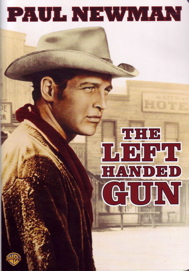
The Left Handed Gun
1958/ B&W / 1:78 enhanced anamorphic / 102 min. / Not Available Separately
Starring Paul Newman, Lita Milan, John Dehner, Hurd Hatfield, James Congdon, James Best, John Dierkes
Cinematography J. Peverell Marley
Art Direction Art Loel
Film Editor Folmar Blangsted
Original Music Alexander Courage
Written by Leslie Stevens from a play by Gore Vidal
Produced by Fred Coe
Directed by Arthur Penn
The western goes overtly psychological in Arthur Penn's first directorial outing The Left Handed Gun, a film that successfully replaces traditional production values with fussy characters and themes suitable for critical analysis. It's a good movie that also seems to be chasing its tail, intellectually speaking. Paul Newman initiated the project and garnered Penn his first directing assignment, turning a couple of back-lot sets into a watchable gun-slinging tale strongly inclined toward New York TV ideas. Some sources report that Gore Vidal's original play interpreted Billy the Kid in homosexual terms, whatever that means.
You have to give credit where it's due: The Left Handed Gun was no box office hit but was extremely influential. Subsequent Billy the Kid epics borrow its scene structure and its theme of Alienated Gunfighter Chic: Marlon Brando's One-Eyed Jacks and Sam Peckinpah's Pat Garrett and Billy the Kid. Paul Newman's confused killer cowpoke might be called I Was a Teenage Gunfighter if it were not for the quality of the writing and direction.
The movie is recognizably Penn's in form, or he decided to adopt the themes of Leslie Stevens' and Gore Vidal's script for his later work. The balance is between the immature world of Billy, a 'kid' fond of singing and carousing with his two equally inexperienced pals Charlie and Tom, and the 'grown-up' world of serious violence. The society around Billy is laced with commitments and politics -- Pat Garrett's marriage, the cattle war, his friends in town -- but Billy doesn't know how to be faithful to his word, or how to manage a stable relationship. That's consistent with later Penn protagonists in Mickey One, Bonnie & Clyde, The Chase and Little Big Man: All are kids caught up in confusing 'adult' problems. The New Wave crowd praised The Left Handed Gun (when domestic reviewers ignored it) and adopted some of Penn's ideas. Bonnie & Clyde started life as a project that might have been made in France. The gag of a tortured existential crook facing the law with no gun or an unloaded gun would become a given in several French Melville cops 'n' robbers shows.
Later genre criticism examined The Left Handed Gun and found it rich in thematic material, mainly because Penn's direction communicates much of Vidal's psychosexual context heaped into the screenplay by Stevens. Billy is seeking father figures -- trail boss Tunstall, Pat Garrett and Mexican friend Saval (Martin Garralaga). That means that when he seduces Saval's young wife Celsa, he's sleeping with his 'mother.' Billy's pals' adolescent attitude to sex includes making inappropriate jokes like giving Pat spurs for a wedding present. The movie's violent content no longer seems to be buried subtext -- guns might as well be sex organs. James Best runs around a party squirting wine at people out of a pigskin ... that sort of thing. The film's tone encourages dirty -- excuse me, sensual -- interpretations of nearly everything.
Is this the first western in which the hero surrenders with his arms thrown wide, striking an intentionally Christ-like pose? Probably not.
Arthur Penn has an almost instant rapport with the camera. He tells the story clearly and uses unfussy but interesting angles making something halfway fresh of studio exterior sets we've seen 50 times. His small touches prefigure Peckinpah (when a little girl laughs at Denver Pyle's Ollinger, blown clear out of his boots) and find clever visuals of their own, as when the boys 'shoot (the reflection of) the Moon' right out of a pond.
Paul Newman is charming, precise and intense -- it's a trained actor's performance and not really a personal one. Solid support from John Dehner helps the story along. Lita Milan is just so-so but James Best and James Congdon excel as Billy's luckless buddies. The symbolic frontier mythmaker Moultrie is possibly Hurd Hatfield's best role and nothing like his usual upper-class cold-fish characters. Under Penn's direction, even the rather stiff actor John Dierkes gives a particularly affecting performance.
The Left Handed Gun has a good enhanced B&W transfer and very clear sound. The important extra is Arthur Penn's commentary, which shows that he's a solid believer in the mythical and sexual subtext of the story. He also explains how he originally ended the film. The studio filmed a new last couple of shots that he doesn't like: Instead of a ring of Mexican women bringing flowers to Billy's body, the movie ends on a limp scene of Pat Garrett's wife bidding him to come home. That's like ending Bonnie & Clyde after the ambush, with the sheriff coming home for lunch.
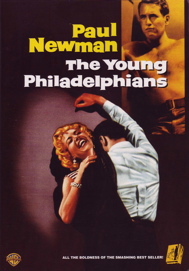
The Young Philadelphians
1959 / B&W / 1:78 enhanced anamorphic / 136 min. / Not Available Separately
Starring Paul Newman, Barbara Rush, Alexis Smith, Brian Keith, Diane Brewster, Billie Burke, John Williams, Robert Vaughn, Otto Kruger, Paul Picerni, Robert Douglas
Cinematography Harry Stradling Sr.
Art Direction Malcolm C. Bert
Film Editor William Ziegler
Original Music Ernest Gold
Written by James Gunn from the novel The Philadelphian by Richard Powell
Produced by James Gunn
Directed by Vincent Sherman
This is the movie where Paul Newman walks into an office, and the receptionist says, "Merry Christmas, Mr. Lawrence!" Newman's final film on his original Warners contract gives him a so-so role in an entertaining soap opera about the Main Liners of Philadelphia. The top citizens of that town struggle to achieve or maintain their social status, worshipping the money of the established families. Newman's young lawyer is described as ruthless go-getter, when his actual rise to fortune is based only on a couple of opportunistic gambles and the whims of a pulpy storyline. In other words, good fun and low literary merit.
The Young Philadelphians is an old-fashioned story about getting ahead that assumes that the only life worth living is to be found among the upper crust. The more Tony Lawrence looks, the more corruption he sees. Chet Gwynne's family conspires to keep his money from him, and Tony's fiancée's father tricks him into throwing away his marriage to Joan. The movie never really offers an alternative a chance. Brian Keith and Paul Picerni's proletarians urge Tony to get into politics, which are presumed to be a force 'for the people.' It's implied that politics and Old Money don't mix, which is silly; the bigwigs would love to have a popular politician like Tony representing their interests.
Anthony Lawrence doesn't claim to be on a crusade for social justice. He only wants to be independent, and his career gambles aren't exactly Earth-shattering. He uses connections to steal college friend Paul Picerni's job opportunity, and he later nabs a major client (silly Billie Burke) from Gilbert Dickinson, in sort of a revenge business move. He doesn't go after the client; she comes to him. Tony ends up taking a big risk. The final courtroom confrontation is his triumph. He saves his best buddy Chet from a murder rap and does it without dragging the Main Liners' dirty secrets out in the open, therefore saving his own career. As it turns out, the family conspiracy against Chet is just the work of one 'evil' man (played by Robert Douglas, the villain of The Fountainhead). The Main Line is greedy, vindictive and prejudiced, but they're not all bad.
The funny part of the rather foolish courtroom case is that Tony wins by making Richard Deacon look like a self-important fool, something we know as soon as we see Deacon's face. Tony's stated self-discovery at the end is that he's neither as bad or as good as he thought he was. What he doesn't state is that he's won all the marbles. Now the most successful man in town (and about to marry a fabulously wealthy widow), Tony will be able to go on doing his great work for society -- helping ditzy old bluebloods avoid paying taxes on their millions.
The efficient script uses some fairly corny shortcuts, like having a diner meal of hamburgers & chili represent Tony and Joan's no-frills honest love for each other.
By this time Paul Newman was a major Fox star and Warners doesn't spend a lot of effort mounting a giant production for him. He handles many of the story's big dramatic revelations by underplaying. The big scene arrives when Keith and Brewster reveal the truth of his parentage, and Newman's reaction is just a wide-eyed 'gee whiz.' In the trial scene he seems to want to show everyone, including his mother, that he goes his own way. Of course, 'going his own way' means getting everyone off the hook by blaming the murder on a dead man!
Barbara Rush is gorgeous but thin in the acting department, and is directed to behave stuffy and cold as soon as she becomes a rich widow ... carrying a walking stick! Of the rest of the cast only Brian Keith is a real standout. He plays Newman's father but is only four years older, and both he and Diane Brewster undergo some really pitiful age makeup -- vanilla cake frosting for a moustache?
Alexis Smith comes off very well as Carol Wharton, the young wife of Tony's benefactor (Otto Kruger). The movie contrives a sexy midnight meeting for them, but our hero throws on the brakes. It's a particularly lame scene. Tony claims he wants to run away with her, when we'd never believe he'd throw away his big chance to succeed. And he won't just have sex with her 'without taking responsibility.' Thus she is the one to call off the affair before it begins. Tony is trumped up as ruthless opportunist but remains a saint for the MPAA code.
Camp honors go to Adam West for his quick turn as Kate Lawrence's (presumably) homosexual groom, who kills himself because he cannot face his shame. Why his fussy mother would force a marriage she knows will not work, or why he goes through with it, can only be explained by the denial caused by social pressure, and that would take another movie to explain. In the 'shocking' shorthand of this movie, it plays as unintentional hilarity. All that's missingis a shot of a wrecked Batmobile crashed down on Liberty Square.
Robert Vaughn emerges as the big winner, nabbing an Oscar nomination for his show-offy turn as a besotted amputee murder suspect, complete with anguished looks and tearful breakdowns. A year earlier Vaughn was Mister Invisible insofar as honors were concerned, the dubious star of vehicles like Teenage Caveman and Unwed Mother, where he perfected his terrific heel character. Does that make him the first of Roger Corman's 'unknown' actors to hit the big time?
The B&W enhanced transfer of The Young Philadelphians looks fine, from the high contrast ersatz 'Saul Bass' titles through two hours of flat-lit studio sets. The picture played much more smoothly on DVD than on old commercial television, where the 1925 prologue was frequently lopped off, making a lot of the story incomprehensible.
The late director Vincent Sherman recorded commentaries for all of his films. He's paired with USC professor Drew Casper.
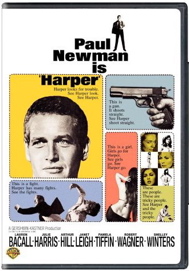
Harper
1966 / 121 min. / Available Separately at 19.98
Starring Paul Newman, Lauren Bacall, Julie Harris, Arthur Hill, Janet Leigh, Pamela Tiffin, Robert Wagner, Robert Webber, Shelley Winters, Harold Gould, Strother Martin
Cinematography Conrad Hall
Art Direction Alfred Sweeney
Film Editor Stefan Arnsten
Original Music Johnny Mandel
Written by William Goldman from The Moving Target by Ross Macdonald
Produced by Jerry Gershwin, Elliott Kastner
Directed by Jack Smight
Cut to seven years later and Paul Newman is as big a star as they get, one of the best-looking, dependably superior movie stars around. His acting has improved beyond accusations of by-the-book mannerisms, and behind the blue eyes is a personality that can become many credible people, even a completely unlikable heel in Hud. Harper is a fun throwback to the 1940s as seen through the popular detective novels of Ross Macdonald. William Goldman's first script is a jokey and entertaining charmer. He gives Newman's detective hero clever dialogue that's neither hardboiled parody nor sarcasm for its own sake. Goldman later came down with a serious case of the Cutes in Butch Cassidy and the Sundance Kid but in Harper the poles of intrigue and crowd-pleasing humor are in balance. His eccentric, 'what the hell?' ending joshing the self-seriousness of pulp fiction is particularly good.
Paul Newman is now so big that assembling an all-star cast is not a problem, and Harper has the pick of the industry to fill each character slot with the right actor. The character suits Newman well, as Harper is unimpressed by pretension and wealth and greets every new situation with a good-natured, slightly-hip resignation. He's not in control of the case and has no illusions that his greedy client wants her husband found, but he certainly sees himself as a man with a worthy mission. It doesn't matter that in thriller terms his efforts end in failure ... we're sold on this dogged P.I. hero.
William Goldman keeps the characterizations sharp and the plot on track. Robert Wagner seems an okay dude, but rich men's pilots tend not to be good guys in movies like this (see Buzz Kulik's Warning Shot). Shelley Winters' gross broad act is a welcome diversion and Pamela Tiffin is an appropriately flaky Young Thing, especially when introduced go-go dancing on a pool's diving board (to music from an ancient Muntz 4-Track Tape Player!). 1 Robert Webber and Roy Jenson are bad guys dealing with 'spiritual guru' Strother Martin, who runs a freaked out hilltop temple on land donated by the eccentric missing millionaire. Fans of Lauren Bacall and Julie Harris will be happy, as both have short but strong roles. Quiet Arthur Hill benefits from careful direction.
Harper moves from chase scene to funny character situation to perhaps one-too-many klunks on the head for Lew Harper. Goldman commits some funky missteps along the way. Martin West's dummy deputy is unnecessary and the scene in which Harper torments Robert Wagner is clumsy too. As it is, almost everyone (surprise) turns out to be something different than they appear, which makes us forgive Lew for seeking solace with his fed-up wife Janet Leigh. He shows up at her doorstep wounded and needy and cruelly allows her to think he's returned for good.
Jack Smight keeps things running smoothly. The film references a fictional town that is obviously meant to be Santa Barbara. Familiar L.A. locations represent both locations, which sometimes leads to confusion ... we're told Harper is headed for L.A. and are shown a glimpse of Santa Monica, but then find that he hasn't left the other town yet. Other than those stumbles the film offers a slick look at Los Angeles in the middle 60s. A Malibu spur road leads Harper by a glancing view of the atomic house from Kiss Me Deadly. I wonder if, in 1966, anybody associated with Harper was even aware of that picture -- beyond Strother Martin, who had a small role in it.
Harper on DVD has a clean enhanced transfer. Conrad Hall's sharp Panavision photography is a major asset, as is Johnny Mandel's jazzy score. Julie Harris even sings a song. The William Goldman commentary is a good listen. He comes up with a lot of specific details and star reminiscences to go along with his usual 'protect the star' riff and other screenwriting lessons to live by. But we have to be discerning with Goldman too. He mentions salting the notion that Julie Harris' character can hot-wire a car, and calls it good writing. It mostly tips us that Harris can be expected to hot-wire a car, and that Goldman is plugging holes in a leaky, over-complicated plot!
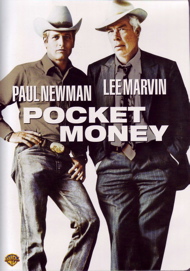
Pocket Money
1972 / 102 min. / Not Available Separately
Starring Paul Newman, Lee Marvin, Strother Martin, Wayne Rogers, Hector Elizondo, Christine Belford, Kelly Jean Peters, Gregory Sierra
Cinematography Laszlo Kovacs
Art Direction Tambi Larsen
Film Editor Bob Wyman
Original Music Alex North
Written by John Gay, Terrence Malick from the novel Jim Kane by J.P.S. Brown
Produced by John Foreman
Directed by Stuart Rosenberg
Jet forward another six years and Newman is about to go into a career middle-aged slump. He still has The Sting ahead but also a decade of iffy projects, sell-out payday pix (The Towering Inferno), failed work for Auteur directors and the occasional hit like Slap Shot. I don't think he really recovered his bearings until The Verdict in 1982. From then on he would make projects that suited him, often almost as a character actor instead of the star player.
Pocket Money is the kind of '70s character-study sort of picture that actors loved to do but audiences didn't always appreciate. A story of modern cowboys, it has several amusing moments but is mostly a downer -- after being tipped off that our heroes are going to be fleeced throughout the picture, it's not a lot of fun watching it happen.
The 70s saw a pack of modern-cowboy sagas, almost all of them grim tales about men falling victim to alcoholism and changing times: J.W. Coop, Junior Bonner, When the Legends Die, The Honkers. Stuart Rosenberg had hit big with Paul Newman in Cool Hand Luke and rolled the dice with him three more times, but none of the shows came through box office-wise.
There are plenty of pleasures in Pocket Money , mostly of the behavorial kind. Paul Newman plays his cowboy hero straight, honest, and not too bright. His ex-wife calls him a baby, and Jim Kane is definitely not the aggressive type. He makes bad decisions with disreputable people and then follows through as if the deals are honorable. Every Mexican trader he meets gets the better of him. Jim tells his uncle he doesn't know how to bid, a skill that can't be taught.
Newman plays straight man to Lee Marvin's amusing Leonard, who rides the range in a mangy suit and has a useless adage for every situation. Leonard tries to be a tougher dealmaker but his swagger cuts no mustard in Mexico either. Staring at the stars at night, Leonard says that every man ought to have a star to follow, and then adds that he probably doesn't have one. Put together two guys with faulty self-esteem, and the partnership may function but the business is doomed.
Together, Kane and Leonard are almost like Laurel & Hardy. Jim hardly has a sense of humor while Leonard clowns to no effect.
There are indeed some hilarious moments, like the awful surprise that comes when Leonard bails Jim from a rigged jail sentence by selling his truck at a loss. Pocket Money is very much like the old Henry Fonda - Glenn Ford movie The Rounders in that everybody including our heroes knows they're going to be cheated, and badly. Forced to take one more financial drubbing, Kane doesn't think it matters, because Garrett's going to shaft them anyway.
This lack of hope amid the back-breaking work, humiliating negotiations and occasional beatings makes Pocket Money into a masochistic experience. We admire the characters and the craft, but where's the joy?
The fine script -- with great dialogue -- is by Terrence Malick, soon to become the Hollywood legend by directing only four films in four decades. He has a bit somewhere in the movie. Everyone's favorite sad sack Matt Clark also has a nice bit as an American marooned in the Mexican hoosegow.
Pocket Money looks good in this enhanced transfer; previous flat TV prints lost compositional interest by showing too much empty space above and below. Opticals tend to be grainy, as often seemed to be the case in the early 1970s, and the film ends with a typically ugly freeze frame. There are no extras save for a trailer.
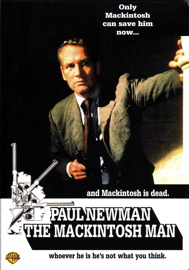
The MacKintosh Man
1973 / 98 min. /
Starring Paul Newman, Dominique Sanda, James Mason, Harry Andrews, Ian Bannen, Michael Hordern, Nigel Patrick, Peter Vaughan
Cinematography Oswald Morris
Production Design Terry Marsh
Film Editor Russell Lloyd
Original Music Maurice Jarre
Written by Walter Hill novel The Freedom Trap by Desmond Bagley
Produced by John Foreman
Directed by John Huston
For his second collaboration with John Huston, Newman went to Malta and also to Huston's home ground of Ireland to film an espionage story adapted by the hot new writer Walter Hill. The MacKintosh Man is a low-key thriller that didn't raise much excitement from Bond-addled spy fans, but it has aged well for viewers who appreciate intelligent stories interestingly told.
The MacKintosh Man is a good thinking man's spy picture on the order of The Quiller Memorandum, but with a little more action. Newman's expert undercover agent purposely draws a 20-year prison term to get close to a slick escape organization. That in itself is an old crime thriller standby, but Walter Hill's script and Huston's direction get us to believe than Newman's agent would volunteer to do it. The prison details are convincing as is the escape plan and the secret hideaway house where the criminals hold the escapees to await release.
Up to a point it's also fun figuring out the characters, especially when exactly what Rearden is up to isn't made clear until the end of the first act. Dominique Sanda is inexpressive but interesting enough as the leading lady. Ian Bannen makes a good official secrets traitor and Michael Hordern is good as the escape mastermind, Mr. Brown.
Unfortunately the credible start of the film falters, first a little bit and then a lot. Not that it keeps the movie from holding our interest, but we have to start asking ourselves some questions.
(spoilers) Rearden is put in prison to break out with Slade and nab the escape organization. How does he know he'll be offered an escape? How does he know that his escape will be combined with Slade's? MacKintosh says he knows nothing about the criminal setup.
(more spoilers) James Mason's Sir George Wheeler is not a very believable character. He's an ultra-conservative member of the House of Lords and also a key spymaster for "the other side," sort of a combination of Philip VanDamm from North by NorthWest and Stephen Fisher from Foreign Correspondent. Why would England's enemies jeopardize a double agent placed so highly by getting him personally involved in smuggling spies and doing work with prison breaks?
(spoilers) Director Huston makes excellent use of his Irish countryside in a great chase that for once demonstrates a logical way of getting a vicious hound off one's tail. It ends in a truly hair-raising car-off-cliff combo. But when they get to Malta, Mrs. Smith makes a bonehead mistake not telling the lady who recognizes her to be discreet, and Rearden shows us exactly why Hitchcock doesn't let his heroes run to the police. The story grinds to a halt for fifteen minutes. Rearden would have done better charging onto the boat by himself, or just observing it and following the bad guys when they left.
For thriller fans that like gritty heroes figuring out tough problems without gimmicks or ridiculous coincidences, The MacKintosh Man will be a good show. It's not as cynical as Huston's superlative The Kremlin Letter -- a great, maligned essay on ruthlessness -- but it has its special moments. While kept in hiding, Rearden is imprisoned and patronized by a beautiful but sadistic warden played by Jenny Runacre. She explains turning him down for sex because, she says, "I stopped being a woman," and later delights in kicking Rearden in the groin. When given the chance he makes sure to return the favor with his boot. It's only the second instance of violence in the movie, at least forty minutes in, and audiences loved it. Too bad they didn't walk out of the show on the same high.
The MacKintosh Man looks okay in this enhanced transfer but the original film has a few out-of-focus shots and grainy ones resulting from optical blowups to re-frame the picture, as when James Mason speaks to Harry Andrews in Parliament. The titles look grainy and dirty too. Even big-studio pictures tended to look grungy in the early 1970s. One big plus to be factored in is Maurice Jarre's repetitive but atmospheric score.
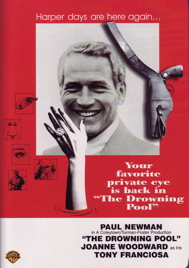
The Drowning Pool
1975 / 109 min. / Not Available Separately
Starring Paul Newman, Joanne Woodward, Anthony Franciosa, Murray Hamilton, Gail Strickland, Melanie Griffith, Linda Haynes, Richard Jaeckel
Cinematography Gordon Willis
Production Design Paul Sylbert
Film Editor John C. Howard
Original Music Michael Small
Written by Tracy Keenan Wynn, Lorenzo Semple Jr., Walter Hill from the novel by Ross Macdonald
Produced by David Foster, Lawrence Turman
Directed by Stuart Rosenberg
Looking to make lightning strike twice, Newman returned to his Lew Harper character in another adaptation of a Ross Macdonald tale. He handles it very well, especially in the youthfulness department -- Paul is a very trim 50. But things have changed. Private eye television shows exploded again and Lew Harper's adventures aren't all that much more exciting than the average episode of The Rockford Files. The Drowning Pool is also darker and less humorous than the earlier film, and Newman spends most of his time suffering from setbacks both professional and personal.
A Los Angeles private investigator goes to Dixie in another major 1975 movie, the much more interesting Night Moves with Gene Hackman. It also stars young Melanie Griffith in as a sexually provocative teen jezebel. The Drowning Pool is a good mystery in the tradition of 'round up the usual co-stars.' It's also drawn out and sometimes pointlessly grim.
Lew Harper mixes into the back-bayou intrigues of Louisiana, giving us a few scenic views and a close look at a pot of stuffed shrimp to drum up local color. Otherwise it's the usual tangle of double crossers and thugs. Harper gets beat up a lot less in this episode, which is good because we're no longer willing to believe he can take unlimited punishment.
Stuart Rosenberg's dark attitude to the material keeps many of the expected thrills from occurring. Accosted by beautiful women, Harper remains true to his mission, but his lady fair Joanne Woodward looks ready to wilt from scene one and isn't given enough screen time to involve us in her predicament. The fact that it's the wonderful Ms. Woodward helps somewhat, but her character already seems to have given up. Then people start getting klonked on the head, shot and otherwise rubbed out, The Drowning Pool morphs into a standard body-count thriller. Instead of interacting with Woodward's Iris, Harper's attention is spread around three other female characters.
The compensation offered by the classy supporting cast keeps us glued to the story, however. Coral Browne and Anthony Franciosa are eliminated or marginalized for most of the picture and have only a limited impact, but there are meaty opportunities for Murray Hamilton (a mad oil man who loves to breed killer pit bulls) and youngster Melanie Griffith. Gail Strickland gets a great turn as Hamilton's terrified wife, as does the talented and little-used Linda Haynes, as a fair-minded prostitute. Oscar-nominated for Sometimes a Great Notion, Richard Jaeckel returns to menace Newman as a second-string baddie. The talented Andy Robinson, so strongly stereotyped from Dirty Harry, is a sympathetic bad guy / fall guy. Richard Derr (When Worlds Collide) and Helena Kallianiotes (Five Easy Pieces) have smaller parts.
The big 'drowning pool' scene is a clever variation on a situation from Fritz Lang's classic The Testament of Dr. Mabuse: The hero and heroine in that 1932 film are left in a sealed brick room, unable to reach a bomb that will blow them up in a matter of hours. The hero finally thinks to break a pipe and the room fills with water, almost drowning them. When the bomb goes off the mass of water cushions the blast.
In this story (which I'm not suggesting has been copied) Newman and Strickland are locked into a sealed asylum dungeon and have only a few hours to live. High-powered water sources abound, so they flood the room hoping to escape through the metal skylight at the top. The tiled dungeon becomes a deep pool. But only when there's little or no breathing space left do they find they can't make the skylight open.
It's a great scene, and we don't mind that to set it up the writers have had to make Murray Hamilton's Kilbourne into a lunatic. He's bought the asylum in which he was once committed, and now can use it for private torture sessions.
The Drowning Pool looks fine in this enhanced Panavision transfer, even the many overly dark scenes that must have made it unwatchable at the drive-in movies. The clear audio includes only a few bars of Charles Fox and Norman Gimbel's great song Killing Me Softly with His Song. It had already been a radio hit for Roberta Flack in 1973 and surely would have done the movie a lot of good, had it just been featured under the titles or used as a main theme to enhance the presence of Joanne Woodward's character Iris.
Besides a trailer, we're given a making-of promo piece, Harper Days are Here Again showing a bit of location filming.
The only downside to The Paul Newman Collection is that fans crazy for only one title will need to invest in the whole package; only Harper has been marketed as a separate release. The general Paul Newman fan with $40 to spend won't be complaining. I'm curious to know what users think of the new Slim Cases for these boxed collections. Are you for or against? Would you like to see them supplant keep cases, and thus make room on shelves for more discs?
On a scale of Excellent, Good, Fair, and Poor,
|
Somebody Up There Likes Me rates:
Movie: Excellent Video: Excellent Sound: Excellent Supplements: Commentary by Paul Newman, Robert Loggia, Director Robert Wise, Martin Scorsese, and Richard Schickel, Trailer |
The Left Handed Gun rates:
Movie: Very Good Video: Excellent Sound: Excellent Supplements: Commentary by director Arthur Penn, Trailer |
|
The Young Philadelphians rates:
Movie: Very Good Video: Excellent Sound: Excellent Supplements: Commentary by Vincent Sherman and film historian Drew Casper, Trailer |
Harper rates:
Movie: Excellent Video: Excellent Sound: Excellent Supplements: Commentary by screenwriter William Goldman; Introduction by TCM host Robert Osborne, Trailer |
|
Pocket Money rates:
Movie: Very Good Video: Very Good Sound: Excellent Supplements: Trailer |
The MacKintosh Man rates:
Movie: Very Good Video: Very Good Sound: Excellent Supplements: None |
|
The Drowning Pool rates:
Movie: Very Good Video: Excellent Sound: Excellent Supplements: Featurette Harper Days Are Here Again, Trailer |
Packaging: Seven Slim Cases in Card Box Reviewed: November 19, 2006 |
Footnote:
1. Yes, Savant was a proud teen owner of one of those dubious machines. And no, I'm not 100 years old.
Return
Review Staff | About DVD Talk | Newsletter Subscribe | Join DVD Talk Forum
Copyright © MH Sub I, LLC dba Internet Brands. | Privacy Policy | Terms of Use
|
| Release List | Reviews | Price Search | Shop | SUBSCRIBE | Forum | DVD Giveaways | Blu-Ray/ HD DVD | Advertise |





